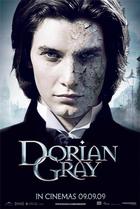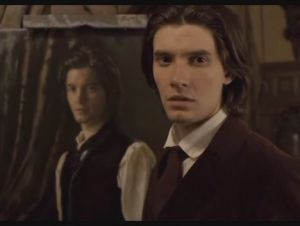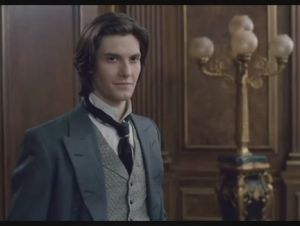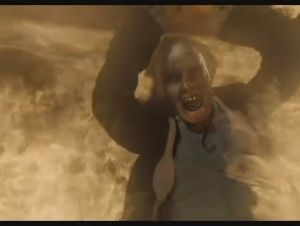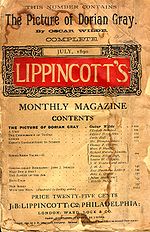Dorian Gray (道林·格雷)
Dorian Gray(道林·格雷) is a British film adaptation of Oscar Wilde's 1891 novel The Picture of Dorian Gray. This version is directed by Oliver Parker, written by Toby Finlay (his first screenplay), and stars Ben Barnes as Dorian Gray. It was released in the UK on 9 September, 2009.
Directed by Oliver Parker
Produced by Barnaby Thompson
Written by Toby Finlay
Starring
Ben Barnes as Dorian Gray
Colin Firth as Lord Henry Wotton
Rebecca Hall as Emily Wotton
Ben Chaplin as Basil Hallward
Emilia Fox as Victoria, Lady Henry Wotton
Rachel Hurd-Wood as Sibyl Vane
Fiona Shaw as Agatha
Maryam d'Abo as Gladys
Pip Torrens as Victor
Douglas Henshall as Alan Campbell
Caroline Goodall as Lady Radley
Michael Culkin as Lord Radley
Johnny Harris as James Vane
Max Irons
Distributed by Momentum Pictures
Release date(s) 9 September, 2009
Country United Kingdom
Language English
Gross revenue £2,967,711
When a naïve young Dorian (Ben Barnes) arrives in Victorian London, he is swept into a social whirlwind by the charismatic Lord Henry Wotton (Colin Firth), who introduces Dorian to the hedonistic pleasures of the city. Henry's friend, society artist Basil Hallward (Ben Chaplin), paints a portrait of Dorian to capture the full power of his youthful beauty. When the portrait is unveiled, Dorian makes a flippant pledge: he would give anything to stay as he is in the picture — even his soul.
Dorian meets and falls in love with young budding actress Sibyl Vane (Rachel Hurd-Wood). After a few weeks, he proposes marriage to her, but after Henry tells Dorian that having children is "the beginning of the end", Dorian and Sibyl argue and he leaves her; the next day he learns from her brother "Jim" (James) that she drowned herself (like the character of Ophelia that she played in the theatre) and that she was going to have Dorian's child before she did. His initial grief disappears as Henry persuades him that all events are mere experiences and without consequence, and his hedonistic lifestyle worsens, distancing him from a concerned Basil. Dorian goes home to find the portrait of himself warped and twisted and realises that his pledge has come true; while the portrait ages he remains ever-youthful, while his sins show as physical defects on the canvas. The chaos of the picture of Dorian Gray starts, leading to him actually killing Basil and dumping the body in the Thames after Basil sees the portrait.
Having left London to travel for many years, Dorian goes back and during the welcome-back party the guests are awed to see that he hasn't aged in all those years that he has been away and he still has the charming face that made everyone fall in love. He also finds himself becoming close to Henry's daughter, Emily, a member of the suffragette movement, despite Henry's distaste for such a relationship based on Dorian's lifestyle. Although Dorian appears genuinely interested in changing his ways as he spends time with Emily, matters are complicated when he is confronted by Sibyl's brother James, seeking revenge for his sister's death; despite Dorian's attempts to drive off his suspicions by pointing out his apparent age, James nevertheless deduces Dorian's true identity, only to be killed in an accident during the chase in the subway. As Dorian makes arrangements to leave London with Emily, Henry's study of old photographs makes him remember the time when he teased Dorian to deal with the devil for eternal youth and beauty at the cost of his soul. This prompts him to go and look in Dorian's house for the portrait which he thinks holds the mystery to Dorian's fountain of youth. In the subsequent confrontation between the two men, Henry is able to knock Dorian out when he tries to kill him because of Emily's calls downstairs and he throws a lit lamp at the portrait causing it to catch fire. Henry locks the gate of the attic, where Dorian and the painting are, before his daughter sees the ruckus. But, Emily arrives in time and asks Dorian for the key. Dorian, after seeing her and realizing that he really loves her, turns his back as Henry drags his daughter out of the house. Dorian then decides to end it all; as the portrait burns his years catch up with him. His last act is to stab the portrait and thus end his tortured life and its suffering and cruelty.
A few months later, Henry is shown attempting to convince Agatha to allow him to talk to Emily, one side of his face badly burned by the fire, and the now-youthful portrait of Dorian Gray kept in his attic.
The Picture of Dorian Gray is the only published novel by Oscar Wilde, appearing as the lead story in Lippincott's Monthly Magazine on 20 June 1890, printed as the July 1890 issue of this magazine.Wilde later revised this edition, making several alterations, and adding new chapters; the amended version was
published by Ward, Lock, and Company in April 1891.The story is often mistitled The Portrait of Dorian Gray.
The novel tells of a young man named Dorian Gray, the subject of a painting by artist Basil Hallward. Basil is impressed by Dorian's beauty and becomes infatuated with him, believing his beauty is responsible for a new mode in his art. Talking in Basil's garden, Dorian meets Lord Henry Wotton, a friend of Basil's, and becomes nthralled by Lord Henry's world view. Espousing a new hedonism, Lord Henry suggests the only things worth pursuing in life are beauty and fulfilment of the senses. Realizing that one day his beauty will fade, Dorian cries out, xpressing his desire to sell his soul to ensure the portrait Basil has painted would age rather than himself. Dorian's wish is fulfilled, plunging him into debauched acts. The portrait serves as a reminder of the effect each act has upon his soul, with each sin displayed as a disfigurement of his form, or through a sign of aging.
The Picture of Dorian Gray is considered a work of classic gothic horror fiction with a strong Faustian theme.
(1)I can assure you,pleasure is very different from happiness...I mean,some things are more precious because they don't last.
(2)It is better to be beautiful than to be good.But … it is better to be good than to be ugly.
(3)what's past is past.
(4)I want to be free,i want to be new,clean,i want to be good.
(5)This is not my true,i have seen my soul,and i could show to you,it's rotten,it's stinks,it's poison.
(6)I've entered the tombs of dead nations,ridden with our last savage tribes.I feel the brilliance of every moment,the splendor of existence and its awful..Dearest Harry,you taught me that life must burn with a hard flame.Its light does not blind me,nor its heat sear me.I am the flame.
Oliver Parker seems to have a “thing” for the works of Oscar Wilde – having already made two films based on the legendary Irish wit’s plays: The Importance of Being Earnest and An Ideal Husband. This time, Wilde’s first and only novel, The Picture of Dorian Gray, is up for cinematic treatment.
A gothic horror-tinged morality story laced with Wilde’s rapier wit; the film adaptation is, like the doomed protagonist of the title, not the most faithful of creatures – even part of the title has been discarded. Now it is simply Dorian Gray.
Parker’s film is successful in allowing the once frowned upon homosexual undertones of Wilde’s novel to be more explicit – indeed in one scene Basil Hallward (Ben Chaplin), the painter of the infamous portrait – is seduced into sexual acts by the magnetic Dorian. As the endless nights of passion and partying go on, Wilde’s great aphorism takes precedence: “I can resist everything except temptation.”
There are shades of Goethe’s Faust and even vampire mythology at work in Dorian Gray – the man sells his soul for eternal youth. Parker ramps up the blood and violence to good effect: one scene has Gray (Ben Barnes) positively bathed in blood; hacking away at a victim who has stumbled upon the truth. In a later montage Gray is seen shooting up and partaking in a spot of sadomasochism.
The cast is uniformly excellent; and its great to see Colin Firth playing against type as the Mephistopheles-like Lord Henry Wotton – a man whose “philosophy of excess” much inspires the young Dorian to make his mysterious pact. Rebecca Hall, as the completely fabricated (for the movie) heroine Emily Wotton is hardly given any screen time before serving as Dorian’s potential saviour. Ben Barnes proves he is more than a good-looking bastard – it takes a while for him to settle; as the young, naïve Dorian he doesn’t quite hit it – as the morally decrepit, serial-shagger Dorian – he is much more self-assured.
By and large, the adaptation by Toby Finlay, allows for the more darker aspects of the source material to shine through. It jettisons fair portions of the novel’s material and some key characters: the tragic early lover of Gray’s – Sybil Vane (Rachel Hurd-Wood) is given little screen time. The film benefits from Oscar Wilde’s satirical and barbed dialogue, and Finlay does a good job at mimicking Wildean-type sound-bites.
However it is possibly the definitive film version. Dorian Gray is a wonderfully complex and tragic character – and his descent into a maelstrom of sex and bad manners – allows for plenty of laughs. He basically acts like a modern-day rock star or a film actor.
Roger Pratt’s sumptuous photography ramps up the gothic atmosphere creating a dark, grey and smoky Victorian-era London that clashes with the opulence of the interiors; whether opium dens, ballrooms or libraries. Some ropey CG effects do stick out like a sore thumb yet that is a minor quibble. So too, the film’s undecided supernatural tone. The picture, given its ultimate “reveal” at the tense finale, seems to be alive somehow; as if Gray’s moral corruptness is spawning some ghoulish, external being. It is a hideous CG creation and does amplify Gray’s distress at a life spent chasing emotionally-empty, sensual, carnal pursuits.
Its ambiguous air as to whether Lord Wotton is some dark, sinister magician or whether Gray is responsible for his own doom is nicely played. Wotton’s decadent and hedonistic philosophy spurs the young man on but he eventually outshines all expectations.
As a black comedy, the film works more successfully than its attempts at tragic gothic-horror with a moralistic twist. Oscar Wilde’s text is ultimately too complex and erudite for the medium of cinema to cope. The pertinent question is: would you sell your soul for an eternity of debauchery and vice? The answer: God,yes.
http://www.filmshaft.com/review-dorian-gray/
See more at http://www.mtime.com/movie/86784/posters_and_images/#menu
附件列表
词条内容仅供参考,如果您需要解决具体问题
(尤其在法律、医学等领域),建议您咨询相关领域专业人士。

